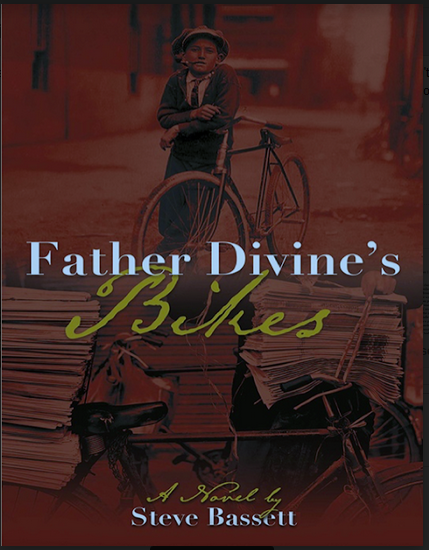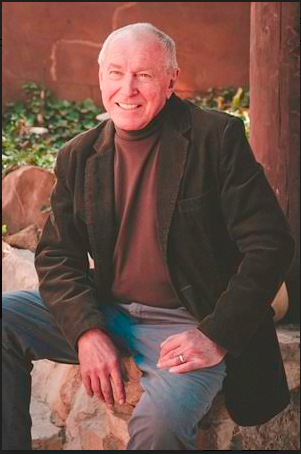
Father Divine’s Bikes
By Steve Bassett
NOIR CRIME THRILLER EXPOSES THE DARK UNDERBELLY OF NEWARK, NJ THROUGH THE EYES OF THREE GENERATIONS IN 1945
We live in a world torn apart by urban unrest, rioting, terrorist bombings, religious fanaticism, and military coups that have turned many cities into vast wastelands. The international questions arise time and time again, “How, and why, did all of this happen?”
Offering an extensive look inside the history and urban problems — and how they began — in post-World War II Newark, New Jersey like never before, author Steve Bassett releases the first in the trilogy, Father Divine’s Bikes [BookBaby, April 2, 2018]. In this noir crime thriller, Bassett melds character, time and place into a mosaic that uncovers the plight of a city on a downward spiral immediately after the war, a time when our nation was basking in the afterglow of victory.
A gangster war, three murders, a gun-toting paperboy, and the numbers racket lay bare a dark, compelling story in a world of poverty and hopelessness from which there is little hope of escape. In the autumn of 1945, a battle rages when the city’s competing mobs end their truce. When it gets bloody, other criminal forces are ready to move in. Citywide corruption is endemic. Bookies using Father Divine’s controversial International Peace Mission Movement as a front, recruit two Catholic altar boys, Joey Bancik and Richie Maxwell, to run numbers under the guise of newspaper routes. The boys quickly realize they are players in a dangerous game, but the easy money is too good to pass up. They are now petty criminals and being hauled into juvie court is a risk they’re willing to take. Two homicide detectives track Joey to a luxury apartment, but arrive too late to prevent the inevitable. Joey’s body lay in a pool of blood on the basement floor.
Father Divine’s Bikes offers a rare study of time and place that introduces the reader to a kaleidoscopic cast of disparate characters.
“It is an uncompromising, noir view of a city in agony, sparing no person or institution,” says Bassett. “At the same time, it retains a raw, sharp-edged compassion for the marginalized people who share their souls with the reader.”
A metaphorical work exploring the in-depth urban issues that arose in 1945 Newark, Father Divine’s Bikes reveals:
- Contrasting themes of class and privilege, poverty and wealth, despair and hope
- The growing lack of trust that communities – large and small – have for the police and local officials
- The handmaiden of change is fear of the unknown – it was true in 1945 Newark, and is even more true today
- Crime is in the eye of the beholder – how this is true in every level of society
- Overwhelming acceptance of the status quo exists in every densely populated, crime ridden, poverty stricken inner city in our country
- And, so much more!

Born and raised in Newark's crime-ridden Third Ward, although far removed during a career as a multiple award-winning journalist, Steve Bassett has always been the proud sobriquet Jersey Guy. He has been legally blind for almost a decade, but this hasn't slowed him down.
Bassett has written two nonfiction books, The Battered Rich and Golden Ghetto: How the Americans and French Fell In and Out of Love During the Cold War. Continuing with his newest fiction release, Father Divine’s Bikes, readers share in his insights that earned him three Emmys for investigative documentaries, and the California Bar Association's Medallion Award for Distinguished Reporting on the Administration of Justice. He now resides in Placitas, New Mexico with his wife, Darlene.
For more information, please visit stevebassettworld.com.
Father Divine’s Bikes is scheduled to be released on April 2nd, 2018 and will be available in paperback and e-book edition from Amazon and wherever fine books are sold.
Simon had developed a tough but fair method of dealing with his customers. Black or white, he treated them all with respect. The cops who patrolled the neighborhood knew he ran a good, clean business. He prospered. Until the day two of Longy Zwillman’s thugs stepped through the front door.
The smaller of the two was neatly dressed with a gabardine suit, freshly blocked hat, and gloves. His companion was big, dark and forbidding, and carried a leather briefcase. His blue suit was rumpled and his tie was food stained. He had a wide smile that could be described as friendly until Simon noticed his expressionless eyes. “What can I do for you gents?” Simon said with some hesitation.
“We got something for you to push.”
Simon looked at the little man. “I’m sorry, but I have enough merchandise.”
“You’ll like this stuff. It’s like printing money. Hy, show the man.”
The big man lifted the briefcase onto the counter and opened it. It contained pornography, magazines, pictures, cards, even 8 mm films.
“It’s all top quality, a lot of it’s from Argentina, the best. They do more than tango down there.” Simon glanced at the cards and at the other crude wares. He knew two things: he could sell them at a good profit, and they were illegal.
“I run a clean business. I can’t use these things. I don’t want any trouble.”
“No trouble. Just take it.”
“Why me?”
“Let’s just say we’ve been watching you. Longy trusts you.”
 RSS Feed
RSS Feed
